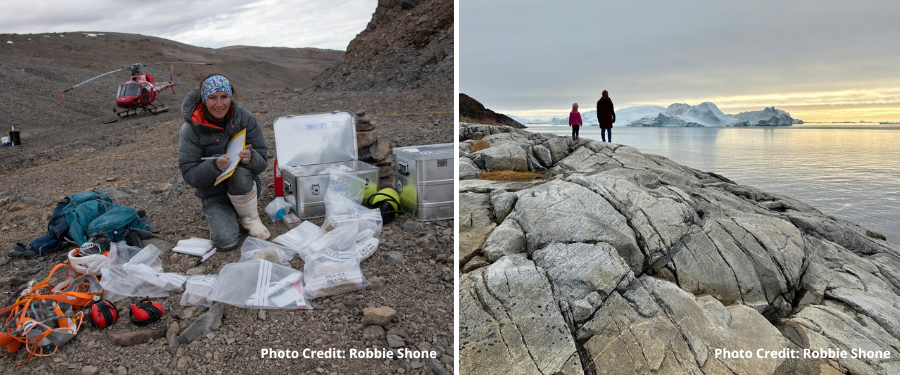Paleoclimatology in Arctic Caves: The Scientific Adventure of Gina Moseley

The day after giving a seminar on her missions in some of the most remote caves on the planet, Gina Moseley returns to the Department of Geosciences at the University of Padua to record an interview.
"The coffee room is fine," she replies when I propose it as an option, as an alternative to a more formal setting like the Council Chamber. We climb together up the stairs leading to the third floor, and immediately her four-year-old daughter Madeleine's eyes fall on the fossils embedded in the stone of the steps.
A Professor of Paleoclimatology at the University of Innsbruck, Gina Moseley is a climate scientist who in 2023 explored the northernmost caves on the planet in northern Greenland, with the aim of gathering information about the planet's climatic past in a crucial area like the Arctic, which is warming twice as fast as the global average.
Through calcite concretions accumulated over thousands of years, caves can reveal climate history, allowing us to go much further back in time than ice cores extracted from ice sheets, which only go back about 130,000 years. By analyzing mineral deposits, which form when water drips into the cave or flows through it, it's possible to discover what was happening even millions of years ago, and this means a great leap in quality in terms of climate reconstruction and comparison between past and present conditions.
Gina Moseley's passion for exploring underground environments began at age 12 when her mother took her to explore her first cave during a camping trip in Somerset, England. During her university years, Moseley realized that her interest in caves could pave the way for a pioneering approach to climate studies, and since then she has conducted numerous explorations, focusing especially on Greenland where she has returned four times.
"The first three before I became a mother and the fourth after the birth of my daughter," Moseley explains, adding that the most difficult part was the separation from Madeleine, who was two and a half years old at the time. Motherhood, adds the British scientist, has led to a deeper awareness of how climate change risks conditioning the future of new generations, and therefore "the way I observe and evaluate data has changed, I feel everything in a much more personal way."

In 2023, Gina Moseley completed the most complex of her explorations, fulfilling a dream that had begun more than ten years earlier when she had heard about the caves of Wulff Land, in the far north of Greenland, which until then had remained unexplored due to the costs and difficulty of organizing such an expedition.
"The hardest part in any expedition is always finding the funds," explains Moseley. The right opportunity presented itself in 2021 when the scientist won the Rolex Awards for Enterprise grant. After two years of meticulous preparation to fine-tune all technical and logistical aspects, Gina was finally able to embark on her expedition, accompanied by Robbie Shone, a National Geographic photographer and her life partner, and Chris Blakeley, a technical climbing specialist. Besides them, only the helicopter that had the task of taking the team back and forth from the base camp to the rock formations.
The samples collected in 2023 are still being analyzed, but the results on those taken from the caves explored in 2015 and 2019 are surprising: the dating suggests that the speleothems could date back even millions of years, to a time when the planet's atmospheric composition was similar to the current one in terms of carbon dioxide levels.
The chat with Gina Moseley then returns to her role as a "mother-in-science," this time to reflect on the balance between private life and professional ambitions. She proudly tells us about launching a project within her department to create spaces dedicated to parents with young children. "There are changing tables, toys, areas for mothers who want to breastfeed or pump milk. These are small things but they can make a difference and send an important message. Some people wondered if this baby room would be used. And the truth is that it was used even before the official inauguration."
Finally, advice for young female researchers or girls who dream of a future in science, perhaps in a field like speleology that can also involve physically demanding explorations. "Women are tough! We have no problems with fieldwork. The important thing is to surround yourself with supportive people, to find out how advanced the culture of inclusion is in the institution you're applying to, and if you receive inappropriate behavior, always speak up. If you're afraid to expose yourself, as can happen at the beginning of your career, my advice is to lean on a female colleague who is in a higher position. In general, we are in a transition phase towards greater awareness and many people are trying to embrace the culture of inclusion. Sometimes there are still stereotypes, but the situation is improving."
"Hosting Gina Moseley was the first event promoted by the Diversity, Equity, and Inclusion Committee, recently established at the Department of Geosciences. I thank the Director for instituting this Committee, which aims to create a welcoming and inclusive work environment capable of offering all the necessary support for the realization of individual aspirations. Thanks to Gina for her participation, and to Francesco Sauro and Ilaria Barone for the organization," stated Professor Gabriella Salviulo, coordinator of the Committee.
Article, video interview, filming, and editing by Barbara Paknazar
Photo Credits: Robbie Shone





